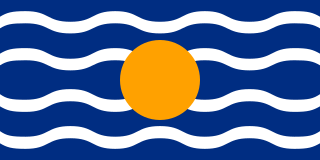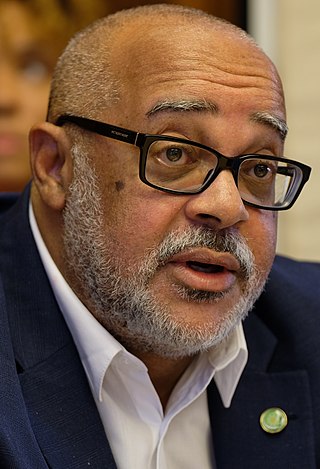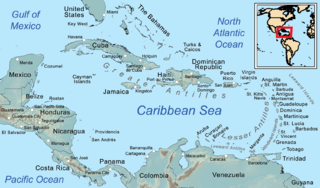| Motto | Oriens Ex Occidente Lux (Latin) |
|---|---|
Motto in English | A Light Rising From The West |
| Type | Regional, public, autonomous university |
| Established | 1960 |
| Chancellor | Mr. Robert Bermudez |
| Vice-Chancellor | Sir Hilary Beckles |
| Principal | Dr Luz M. Longsworth |
| Location | , |
| Campus | Online and regional campuses |
| Colors | |
| Affiliations | Association of Commonwealth Universities (ACU) Caribbean Community Association of Atlantic Universities [1] |
| Website | open |
The University of the West Indies Open Campus (UWIOC) is a public and distance only, research university headquartered Cave Hill, Barbados. It is one of 5 general autonomous units of the University of the West Indies system. Its main campus is located inside the University of the West Indies at Cave Hill, but remains a distinct and separate institution.
The Open Campus was established to improve services to the non-campus territories. [2] [3] It brought together several existing UWI units, namely the University of the West Indies Distance Education Centre (UWIDEC), the School of Continuing Studies (originally the Extra Mural Department), the Tertiary Level Institutions Unit, and the Office of the Board for Non-Campus Countries & Distance Education (BNNCDE).
The Extra-Mural Department was first established in 1947 when UWI was still the University College of the West Indies. [2] As it developed into the School of Continuing Studies, it eventually incorporated the Caribbean Child Development Centre, the Hugh Lawson Shearer Trade Union Education Institute, the Human Resources Development Unit, the Social Welfare Training Centre and the Women and Development Unit.
The University of the West Indies Distance Teaching Experiment (UWIDITE) was an initiative funded by a USD 600,000 grant from USAID. [2] The telecommunications system was first used in St. Lucia, Dominica, Antigua and Grenada to provide access to courses in non-campus territories. At the same time, there was a Challenge Examinations scheme that allowed students to undertake initial (first year) studies in their home territories before joining one of the three campuses. The UWIDITE facilities were used to support the Challenge program. In 1996, UWIDEC, incorporating the UWIDITE and the Challenge Examinations scheme, was established. Further development of the UWIDEC was implemented in 2003.
In 2007, the Open Campus was approved. [2] This Campus was provided with additional financial, human, technology and administrative resources and a structure that was intended to better serve non-campus territories. Aside from the main campus in Barbados, UWIOC maintains presence in 17 English-speaking countries and territories in the Caribbean: Anguilla, Antigua and Barbuda, The Bahamas, Barbados, Belize, Bermuda, British Virgin Islands, Cayman Islands, Dominica, Grenada, Jamaica, Montserrat, St. Kitts and Nevis, St. Lucia, St. Vincent and the Grenadines, Trinidad and Tobago, and Turks and Caicos Islands.
The Open Campus maintains physical sites in most contributing countries. The country sites conduct marketing and recruit new students, facilitate some face to face courses, provide spaces for studying, and some have UWI library branches.
Bermuda does not currently have a Country Site.
The Open Campus offers a wide range of programmes in both distance mode and face-to-face mode at one of its many regional learning centres. At the undergraduate level, the Open Campus offers programmes at the certificate, diploma, associate and bachelor levels in fields such as education, business and public administration, sports, technology, humanities and social sciences. Similarly, at the graduate level, the Open Campus offers programmes at the advanced certificate, postgraduate diploma, masters and doctoral levels in similar areas. The Campus includes courses and certificates that would be considered part of continuing and professional education, prior learning assessment, and summer school courses.
While the Open Campus is the main distance education unit of the University, some other units offer programmes by distance. For example, the UWI/FIFA/CIES Diploma in Sports Management is offered by distance and managed by UWI Mona. Similarly, the Department of Library and Information Studies offers several masters-level programmes in a blended learning format.
In 2019, UWI Open Campus was re-accredited by the Barbados Accreditation Council for the maximum term, ending in 2026. [4] Subsequently, as the Open Campus operates across countries and territories, sought mutual recognition in contributing countries/territories. [5]
The Open Campus, as with the landed UWI campus, has an active research and development environment. The main research unit is the Consortium for Social Development & Research (CSDR). [6] It units several units that were already established before the Open Campus amalgamated several existing units. The units with a significant research mandate (along with educational development) include:
Other units are more developmental in nature, in the sense of improving access to education and training:

The Lesser Antilles are a group of islands in the Caribbean Sea. They are distinguished from the large islands of the Greater Antilles to the west. They form an arc which begins east of Puerto Rico and swings south through the Leeward and Windward Islands almost to South America and then turns west along the Venezuelan coast as far as Aruba. Barbados is isolated about 100 miles east of the Windwards.

The West Indies Federation, also known as the West Indies, the Federation of the West Indies or the West Indian Federation, was a short-lived political union that existed from 3 January 1958 to 31 May 1962. Various islands in the Caribbean that were part of the British Empire, including Trinidad and Tobago, Barbados, Jamaica, and those on the Leeward and Windward Islands, came together to form the Federation, with its capital in Port of Spain, Trinidad and Tobago. The expressed intention of the Federation was to create a political unit that would become independent from Britain as a single state — possibly similar to Canada, the Federation of Australia, or the Federation of Rhodesia and Nyasaland. Before that could happen, the Federation collapsed due to internal political conflicts over how it would be governed or function viably. The formation of a West Indian Federation was encouraged by the United Kingdom, but also requested by West Indian nationalists.

The British West Indies (BWI) were colonised British territories in the West Indies: Anguilla, the Cayman Islands, Turks and Caicos Islands, Montserrat, the British Virgin Islands, Antigua and Barbuda, The Bahamas, Barbados, Dominica, Grenada, Jamaica, Saint Kitts and Nevis, Saint Lucia, Saint Vincent and the Grenadines, British Guiana and Trinidad and Tobago. Other territories included Bermuda, and the former British Honduras.

The University of the West Indies (UWI), originally University College of the West Indies, is a public university system established to serve the higher education needs of the residents of 18 English-speaking countries and territories in the Caribbean: Anguilla, Antigua and Barbuda, The Bahamas, Barbados, Belize, Bermuda, British Virgin Islands, Cayman Islands, Dominica, Grenada, Guyana, Jamaica, Montserrat, Saint Kitts and Nevis, Saint Lucia, Saint Vincent and the Grenadines, Trinidad and Tobago, and Turks and Caicos Islands. Each country is either a member of the Commonwealth of Nations or a British Overseas Territory.
The Caribbean Examinations Council (CXC) is an examination board in the Caribbean. It was established in 1972 under agreement by the participating governments in the Caribbean Community to conduct such examinations as it may think appropriate and award certificates and diplomas on the results of any such examinations so conducted. The council is empowered to regulate the conduct of any such examinations and prescribe the qualification requirements of candidates and the fees payable by them. It is now an examining body that provides educational certifications in 16 English speaking Commonwealth Caribbean Countries and Territories and has replaced the General Certificate of Education (GCE) examinations used by England and some other members of the Commonwealth. The CXC is an institution of the Caribbean Community (CARICOM); it was recognised as an Associate Institution of the Community in the 1973 treaty that created the Caribbean Community. Members of the council are drawn from the 16 territories and the region's two universities, the University of Guyana and the University of the West Indies.

Didacus Jules is the Director General of the Organization of Eastern Caribbean States.

The Caribbean is a subregion of the Americas that includes the Caribbean Sea and its islands, some of which are surrounded by the Caribbean Sea and some of which border both the Caribbean Sea and the North Atlantic Ocean; the nearby coastal areas on the mainland are sometimes also included in the region. The region is south-east of the Gulf of Mexico and Northern America, east of Central America, and north of South America.
The Caribbean Accreditation Authority for Education in Medicine and other Health Professions (CAAM-HP) is an accrediting body for the education programmes and schools of medicine, dentistry, veterinary medicine, nursing and other health professions in the 15 member nations of the Caribbean Community (CARICOM). CAAM-HP was established in 2003 and is headquartered in Kingston, Jamaica.
The Barbados Community College is a tertiary institution located on Eyrie Howells' Road, Saint Michael, Barbados.

A cricket team representing the University of the West Indies (UWI) played several matches in West Indian domestic cricket during the early 2000s, and currently plays at lower levels.

Sir Hilary McDonald Beckles KA is a Barbadian historian. He is the current vice-chancellor of the University of the West Indies (UWI) and chairman of the CARICOM Reparations Commission.

Violet Eudine Barriteau,FB, GCM, is a professor of gender and public policy, as well as Principal of the University of the West Indies at Cave Hill. She was also the president of the International Association for Feminist Economics (IAFFE) from 2009 to 2010, and she is on the advisory editorial boards of Palimpsest: A Journal on Women, Gender, and the Black International, published by SUNY Press, and Signs: Journal of Women in Culture and Society, published by University of Chicago Press.

Federal elections were held in the West Indies Federation for the first and only time on 25 March 1958. The result was a victory for the West Indies Federal Labour Party, which won 25 of the 45 seats in the House of Representatives.
The Caribbean Agricultural Research and Development Institute (CARDI) carries out research and development for agriculture in the Caribbean region. Its headquarters are on the campus of the University of the West Indies (UWI), at St. Augustine in Trinidad and Tobago and it also has national offices throughout the region.
The Samuel Jackman Prescod Institute of Technology is a technical and vocational educational institution located in Pine Hill, Bridgetown, Barbados.
The Erdiston Teachers' Training College is located in Pine Hill, Bridgetown, Barbados. It is affiliated with the School of Education of the University of the West Indies, Cave Hill Campus.

University of the West Indies at Cave Hill is a public research university in Cave Hill, Barbados. It is one of five general campuses in the University of the West Indies system.
The University of the West Indies at Five Islands is a public research university in Five Islands, Antigua and Barbuda. It is the newest of 5 general campuses in the University of the West Indies system.